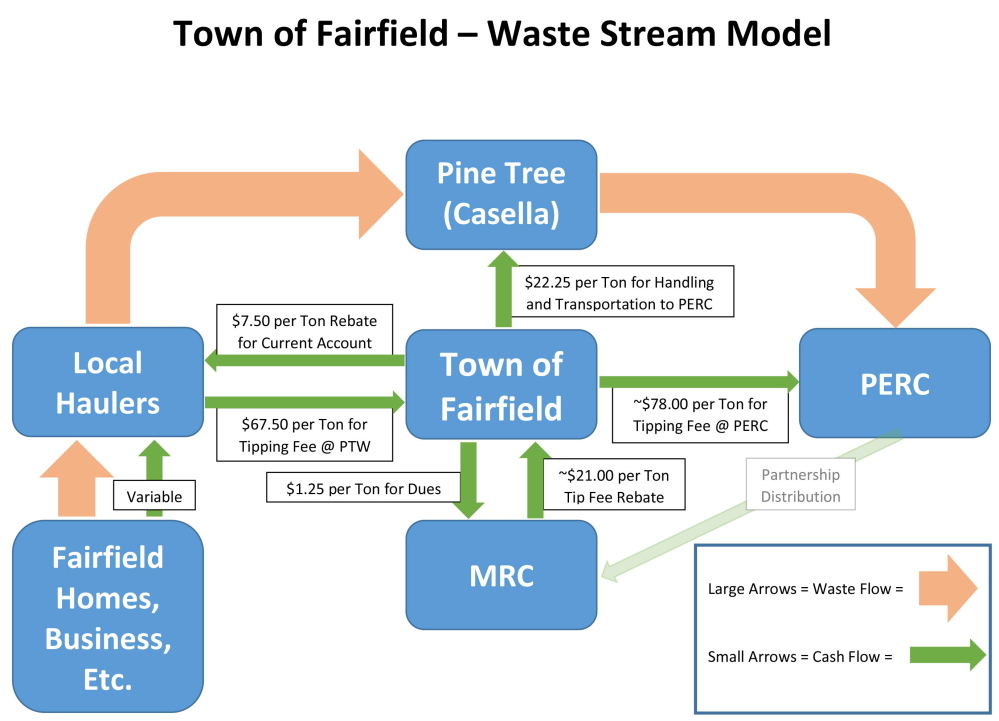FAIRFIELD — The town is taking steps toward a review of its trash collection system even though some officials are reluctant to make changes to the market-based approach.
Fairfield’s approach to solid waste is “likely the most complicated model of any town in Maine,” Town Manager Josh Reny told town councilors in a March 20 memo.
Last month, councilors authorized Reny to begin looking for residents to join a solid waste committee that would review the system.
Reny said recently that the town’s approach to solid waste is “very much a laissez-faire” — in other words, it is left alone and there’s not a lot of oversight.
The town, along with more than 180 other Maine communities represented by the Municipal Review Committee, disposes its waste at Penobscot Energy Recovery Company in Orrington, but does not have municipal garbage collection or a transfer station where it can collect garbage to take there. Instead, independent hauling companies pay the town $67.50 a ton to bring trash to Pine Tree Waste in Waterville. The town pays Pine Tree $22.25 per ton to sort and haul the trash to PERC.
The town’s contract with PERC is set to end in March 2018, as will the contracts with 186 other communities. The towns and cities, represented by the Municipal Review Committee, own 25 percent of PERC, but there are plans to abandon the center in favor of a new waste-to-energy plant a Maryland company plans to build in Hampden.
Council Chairman Robert Sezak said in an interview Thursday that he agrees that Fairfield should take the opportunity to look at how its system is organized and how it might be more effective.
“We’re looking towards the future, to do something before the contract ends,” he said.
Even so, town councilors are reluctant to change the system too much, because it could affect the Fairfield-based trash hauling companies. Out of the four companies that work with the town, three are owned by Fairfield residents.
“There are a lot of us on the council who do not want to put our businesses out of business,” Sezak said.
The town subsidizes private haulers who collect trash by returning a $7.50 per ton rebate as an incentive to pay off their accounts quarterly, Reny said. Other companies can operate in Fairfield, but don’t pay the town to bring trash to Pine Tree, he said.
The arrangement helps the town fulfill the guaranteed annual tonnage it is obligated to send to PERC. Reny estimates that the town sends about 4,500 tons a year there.
Fairfield pays a $78 per ton tipping fee to PERC. The town also pays $1.25 per ton in Municipal Review Committee dues. In exchange for its investment in PERC, Fairfield gets a rebate of approximately $21 a ton from the review committee.
Though offset by revenues, the system is partially paid for through town taxes, according to Reny. Solid waste disposal will cost property taxpayers about $80,000 this year, he said. Because of tipping fee increases at PERC, he estimates the system will cost approximately $100,000.
The town also budgets $6,000 for CMD, a recycling center on Gerald Terrace, and $20,000 for a day-long spring cleanup in May, when the public works department picks up items discarded by residents.
“Most residents likely don’t realize that they are paying the local hauler for waste disposal and paying a portion of the cost through property taxes,” Reny said in an email.
As a result, the system largely operates as an unregulated free market, he said.
There are no guidelines for what companies charge their customers and no restrictions on where they operate, Reny told councilors at a recent town council meeting. Conceivably, there can be multiple companies serving residents on the same street, he said.
Dana Landry, who has collected waste in the town for 28 years, said he can’t see how another approach would reduce costs.
“I can’t imagine Fairfield hauling rubbish for any less than I’m hauling it for,” Landry said.
His company, Landry Rubbish Removal, has roughly 300 customers who pay about $264 a year for weekly trash pick-up, Landry said. Competition between himself and other operators helps keep prices down, but Landry suspects that municipal pick-up would likely turn out costing more.
“If my customers don’t like my price or like my service, there are at least six or seven haulers they can call. That tends to keep prices pretty low,” Landry said.
Peter McGuire — 861-9239
pmcguire@centralmaine.com
Twitter: @PeteL_McGuire
Send questions/comments to the editors.




Success. Please wait for the page to reload. If the page does not reload within 5 seconds, please refresh the page.
Enter your email and password to access comments.
Hi, to comment on stories you must . This profile is in addition to your subscription and website login.
Already have a commenting profile? .
Invalid username/password.
Please check your email to confirm and complete your registration.
Only subscribers are eligible to post comments. Please subscribe or login first for digital access. Here’s why.
Use the form below to reset your password. When you've submitted your account email, we will send an email with a reset code.